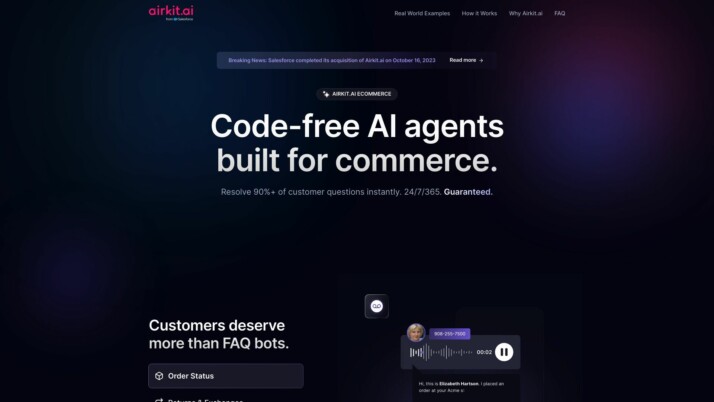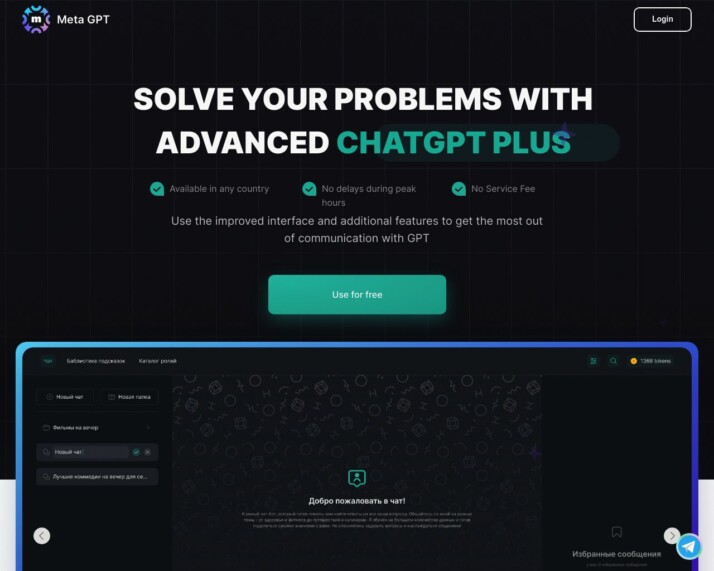Airkit AI vs. MetaGPT: Comparing AI Development Platforms
AI-powered platforms revolutionize software development and customer service. Our comprehensive review compares Airkit AI’s no-code customer support solution with MetaGPT’s multi-agent collaboration framework. We explore each platform’s unique strengths, from Airkit AI’s rapid ecommerce deployment to MetaGPT’s complex project management capabilities.
Developers, business leaders, and AI enthusiasts alike will gain insights into these tools’ features, use cases, and integration potential. We also introduce SmythOS, a versatile alternative that combines ease of use with powerful customization options. This comparison equips readers to choose the ideal AI solution for their specific needs, whether streamlining customer interactions or tackling intricate software projects.
Airkit AI Overview
Airkit AI transforms customer service with AI-powered agents that resolve issues autonomously. The platform integrates seamlessly with Salesforce Service Cloud, enabling businesses to deploy intelligent support across web chat, mobile, voice, and email channels without coding.


Airkit AI transforms customer service with AI-powered agents that resolve issues autonomously.
Airkit AI specializes in ecommerce support, offering pre-built conversational skills to handle common queries about orders, returns, and product information. These AI agents learn continuously from business policies and customer interactions, improving their problem-solving capabilities over time. For complex issues, a Co-Pilot mode allows human agents to collaborate with AI assistants, enhancing overall service efficiency.
The platform’s no-code approach democratizes AI deployment, allowing companies to launch sophisticated support solutions within hours. Airkit AI emphasizes scalability, automatically adjusting to handle demand spikes while maintaining performance. Built-in safeguards and compliance standards ensure responsible AI use, addressing concerns about data security and ethical operations.
While Airkit AI excels in automating customer support tasks, it may not offer the extensive customization options that some enterprises require. The focus on ecommerce may limit its applicability in other industries without significant adaptation. Additionally, the platform’s recent acquisition by Salesforce could impact its future development and integration capabilities with non-Salesforce systems.
Airkit AI’s integration with popular ecommerce and helpdesk systems extends its utility, though the extent of these integrations may vary. The platform’s ability to resolve up to 90% of repetitive customer requests autonomously positions it as a powerful tool for businesses looking to enhance their customer service operations while reducing agent workload.
MetaGPT Overview
MetaGPT transforms multi-agent collaboration by combining human-like workflows with advanced AI models. This open-source framework assigns specialized roles to AI agents, mirroring a software company’s structure to tackle complex tasks efficiently.


MetaGPT’s core philosophy, “Code = SOP(Team),” integrates Standardized Operating Procedures into AI processes. This approach enhances output quality and consistency, reducing errors common in multi-agent systems. The platform excels at breaking down complex projects into manageable subtasks, each handled by a specialized AI agent.
MetaGPT’s core philosophy, “Code = SOP(Team),” integrates Standardized Operating Procedures into AI processes. This approach enhances output quality and consistency, reducing errors common in multi-agent systems.
A standout feature of MetaGPT is its comprehensive documentation generation. The system produces detailed requirement documents, design artifacts, flowcharts, and interface specifications throughout the development process. This thorough approach not only improves the final code quality but also facilitates better human-AI collaboration.
While MetaGPT offers powerful capabilities for software development tasks, it may present a steeper learning curve for non-technical users. The platform’s focus on replicating software company workflows could limit its accessibility for those seeking simple, drag-and-drop AI agent creation. Additionally, the open-source nature of MetaGPT may require more technical expertise for deployment and maintenance compared to some commercial alternatives.
MetaGPT’s vision extends beyond software development, aiming to establish new standards in AI and multi-agent collaboration across various domains. By leveraging human-like SOPs and structured communication protocols, the platform seeks to expand AI capabilities in tackling diverse, complex tasks. This approach positions MetaGPT as a tool for pushing the boundaries of what’s possible in AI-driven problem-solving and innovation.
Feature Comparison
Airkit AI and MetaGPT take divergent approaches to AI agent development, each with distinct strengths and limitations. Airkit AI excels in rapid deployment of customer service AI agents, particularly for ecommerce. Its no-code platform enables businesses to launch AI-powered support solutions within hours, integrating seamlessly with existing systems like Salesforce. Airkit AI’s pre-built conversational skills for handling common ecommerce queries give it an edge in quick implementation for customer-facing roles.
MetaGPT, in contrast, offers a more comprehensive framework for complex, multi-agent collaborations. Its approach of assigning specialized roles to AI agents, mirroring a software company’s structure, allows for tackling intricate projects beyond customer service. MetaGPT’s strength lies in its ability to generate detailed documentation, including requirement documents and design artifacts, throughout the development process. This makes it particularly suited for software development tasks and projects requiring extensive planning and documentation.
While Airkit AI focuses on ease of use and rapid deployment for customer service, it may lack the depth of customization and flexibility offered by MetaGPT for more complex, multi-faceted projects. Conversely, MetaGPT’s power in handling complex tasks comes with a steeper learning curve, potentially limiting its accessibility to non-technical users seeking simple AI agent creation. MetaGPT’s open-source nature offers greater customization potential but may require more technical expertise for deployment and maintenance compared to Airkit AI’s managed solution.
Feature Comparison Table
| Airkit AI | MetaGPT | SmythOS | |
|---|---|---|---|
| CORE FEATURES | |||
| Visual Builder | ❌ | ❌ | ✅ |
| No-Code Options | ✅ | ❌ | ✅ |
| Explainability & Transparency | ❌ | ✅ | ✅ |
| Debug Tools | ❌ | ✅ | ✅ |
| Multimodal | ❌ | ✅ | ✅ |
| Multi-Agent Collaboration | ❌ | ✅ | ✅ |
| Audit Logs for Analytics | ❌ | ✅ | ✅ |
| Work as Team | ❌ | ✅ | ✅ |
| Agent Work Scheduler | ❌ | ✅ | ✅ |
| SECURITY | |||
| IP Control | ❌ | ❌ | ✅ |
| COMPONENTS | |||
| Foundation AIs | ❌ | ✅ | ✅ |
| Huggingface AIs | ❌ | ✅ | ✅ |
| Zapier APIs | ❌ | ✅ | ✅ |
| Classifiers | ❌ | ✅ | ✅ |
| Logic | ❌ | ✅ | ✅ |
| Data Lakes | ❌ | ❌ | ✅ |
| DEPLOYMENT OPTIONS (EMBODIMENTS) | |||
| Deploy as API | ❌ | ✅ | ✅ |
| Deploy as Webhook | ❌ | ✅ | ✅ |
| Staging Domains | ❌ | ❌ | ✅ |
| API Authentication (OAuth + Key) | ❌ | ✅ | ✅ |
| Deploy as Scheduled Agent | ❌ | ✅ | ✅ |
| Deploy as GPT | ❌ | ✅ | ✅ |
| DATA LAKE SUPPORT | |||
| Hosted Vector Database | ❌ | ❌ | ✅ |
| Sitemap Crawler | ❌ | ❌ | ✅ |
| YouTube Transcript Crawler | ❌ | ❌ | ✅ |
| URL Crawler | ❌ | ✅ | ✅ |
| PDF Support | ❌ | ✅ | ✅ |
| Word File Support | ❌ | ✅ | ✅ |
| TXT File Support | ❌ | ✅ | ✅ |
Best Alternative to Airkit AI and MetaGPT
SmythOS emerges as the premier alternative to Airkit AI and MetaGPT, offering a comprehensive agentic AI automation platform that combines the best of both worlds. We deliver a powerful yet user-friendly solution for creating and deploying AI agents across diverse applications. Our platform stands out with its intuitive drag-and-drop interface, extensive integration capabilities, and support for a wide range of AI models.
Unlike Airkit AI’s narrow focus on customer service or MetaGPT’s complex framework, SmythOS provides unlimited use cases while maintaining ease of use. Our visual builder empowers users of all skill levels to create sophisticated AI workflows without extensive coding knowledge. This democratization of AI development sets us apart, making advanced AI functionalities accessible to a broader audience.
SmythOS provides unlimited use cases while maintaining ease of use. Our visual builder empowers users of all skill levels to create sophisticated AI workflows without extensive coding knowledge.
SmythOS excels in its feature set, addressing critical gaps present in both Airkit AI and MetaGPT. We offer robust multi-agent collaboration, enabling teams of AI agents to work together on complex tasks. Our platform supports multimodal interactions, allowing agents to process and respond to various data types, including text, voice, and images. Additionally, SmythOS provides comprehensive debugging tools and explainability features, ensuring transparency and control throughout the development process.
The benefits of choosing SmythOS extend beyond its technical capabilities. We provide unparalleled flexibility in deployment options, allowing users to integrate AI agents seamlessly into existing systems or deploy them as standalone applications. Our platform’s scalability ensures that AI solutions can grow with your business needs, handling increased workloads without compromising performance. Furthermore, SmythOS’s commitment to data security and privacy compliance gives users peace of mind when handling sensitive information.
By choosing SmythOS, users gain access to a versatile, powerful, and user-friendly platform that surpasses the limitations of Airkit AI and MetaGPT. We empower businesses and developers to harness the full potential of AI, driving innovation and efficiency across various industries. With SmythOS, the future of AI agent development and deployment is not just accessible – it’s limitless.
Conclusion
Airkit AI and MetaGPT offer distinct approaches to AI agent development, each with unique strengths. Airkit AI excels in rapid deployment of customer service solutions, particularly for ecommerce, with its no-code platform enabling quick implementation of AI-powered support. MetaGPT provides a comprehensive framework for complex, multi-agent collaborations, mimicking software company structures for intricate project management.
While both platforms have their merits, SmythOS emerges as the superior choice, offering unparalleled versatility and ease of use. Our drag-and-drop interface democratizes AI development, making advanced functionalities accessible to users regardless of technical expertise. With support for over 300,000 integrations and compatibility with various AI models, SmythOS provides unmatched flexibility in creating and deploying AI agents.
SmythOS stands out with its “Create Once, Deploy Anywhere” approach, allowing seamless integration of AI agents across multiple platforms and services. This versatility, combined with features like multi-agent orchestration and extensive pre-built components, positions SmythOS as the ideal solution for businesses seeking to harness the full potential of AI.
We invite you to explore our diverse range of AI-powered agent templates and experience the transformative power of SmythOS. Whether you’re looking to streamline customer service, enhance project management, or innovate your business processes, SmythOS provides the tools and flexibility to bring your AI vision to life. Create your free SmythOS account today and join the AI revolution – no coding required, unlimited agents, and a 30-day money-back guarantee. Discover how SmythOS can elevate your business to new heights of efficiency and innovation.
Last updated:
Disclaimer: The information presented in this article is for general informational purposes only and is provided as is. While we strive to keep the content up-to-date and accurate, we make no representations or warranties of any kind, express or implied, about the completeness, accuracy, reliability, suitability, or availability of the information contained in this article.
Any reliance you place on such information is strictly at your own risk. We reserve the right to make additions, deletions, or modifications to the contents of this article at any time without prior notice.
In no event will we be liable for any loss or damage including without limitation, indirect or consequential loss or damage, or any loss or damage whatsoever arising from loss of data, profits, or any other loss not specified herein arising out of, or in connection with, the use of this article.
Despite our best efforts, this article may contain oversights, errors, or omissions. If you notice any inaccuracies or have concerns about the content, please report them through our content feedback form. Your input helps us maintain the quality and reliability of our information.
